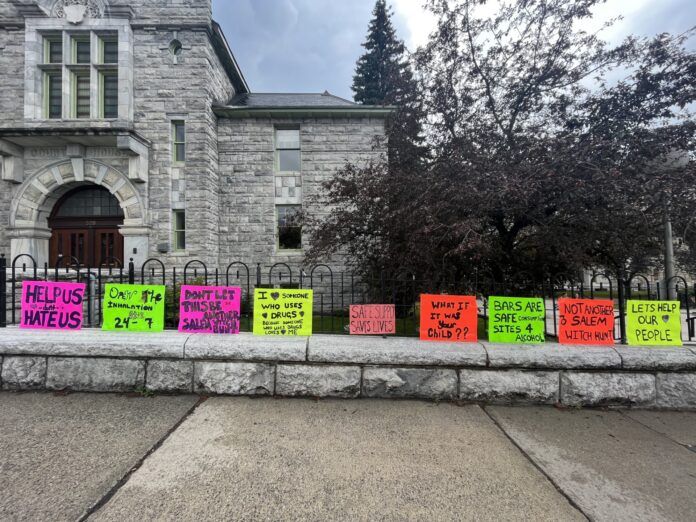Nelson city council has passed third reading of a bylaw prohibiting open use of illicit substances in 12 locations throughout the city, but one councillor changed his mind
Council voted 4-2 in favor of the bylaw which will prohibit open drug use in locations frequented by children.
The bylaw was amended from its first and second readings to prevent bylaw and police officers from using ticketing and other punitive measures as a way of enforcement, and instead will require them to use education.
The decision to adopt the bylaw came despite Interior Health chief medical officer Sue Pollock’s recommendation that council wait until the fall when the province plans to roll out legislation that will provide solutions to better meet the needs of communities across the province.
Councillors Kate Tait, Rik Logtenberg, Jesse Woodward and Mayor Janice Morrison voted in favor of the bylaw, with councilors Leslie Payne and Keith Page against.
Page, who originally voted in favor of the bylaw during its first reading in July, said he feels council should wait for the province to roll out new regulations in the fall and instead work towards providing safe and supervised spaces to direct substance users to go to.
“I’m in the stance of the deferral and waiting to see what the province will bring forward,” he said
“And the reason is I still don’t see where we have figured out the safe consumption site component of this. We are saying we don’t want to have a particular activity existing within particular locations of public space in our community. And yet we also still don’t have an active safe inhalation site available in the community to refer people to.”
Page said he feels the bylaw is less an action to help the public and more a response. He feels council needs to ensure they are coordinating and organizing an appropriate response to the on-going crisis and ensure sufficient services within the city to support homeless people and those who struggle with mental health and addiction disorders.
Woodward, meanwhile, was not present when the bylaw was first debated during July’s special council meeting. He said the bylaw does the bare minimum to ensure all members of the community are protected, and it’s councils role to advocate for everyone’s safety, not just members of specific groups.
“I guess one thing that’s been running through my brain over this whole experience over the last couple of months as we’ve been trying to grapple with this in our hometown is ‘what about the rest of us?’” he asked.
“The job of council here is to look out for all the people who live in town and a couple of words that have been running through my head are ‘bare minimum’ safety protocols. We all deserve to be able to walk around our town and feel safe, so our kids run around at a park and not have to worry about a needle or a shattered pipe or a bag of fentanyl on the ground.”
Tait said she consulted members of the marginalized community over the last few weeks and learned many who struggle with substance abuse are in favor of the bylaw if it means protecting other members of the community from their own struggles.
“Nelson is a really caring community. I went to speak with some of our really vulnerable, unhoused folks. I’ve been a number of times over the past week for several hours and they told me what they want, which is dignity, privacy, and health care. So I think that if we can have a way to educate all of our important community members on which spaces are appropriate for which activities, that this amendment hopefully will give us the way to have those conversations.”
Tait emphasized one conversation she had with a woman suffering with substance abuse who agreed with council’s argument that the bylaw is about protecting children.
“The language that one user said to me was ‘I don’t want my struggles to be normalized or on display for children, we just need space, and we need appropriate location.’”
Morrison said the bylaw is about finding a balance that suits both sides of the crisis, those who struggle with addiction and those who have public safety concerns.
Morrison says she cannot provide a solution that will ensure everyone’s needs are met, but regardless of whether the bylaw passed, the work that needs to be done to solve the toxic drug crisis will not end.
“We all understand that there is a social contract that we all have to live by because nobody wants to live in anarchy. I hear that consultation is ongoing. Consultation is not going to stop whether we pass or we don’t pass this bylaw, because this is not a one-stop solution. As far as I can see, I don’t know what the solution is to this problem.”
Morrison says it’s Interior Health’s job to develop a plan in the fall that includes not only harm reduction, but recovery. She said it’s also essential that the province develops a plan that can be delivered in a rural setting. However, she said she understands the community can’t wait for a solution from the province to address some of the concerns.
City staff said they will call a special council meeting in the coming weeks to discuss adoption and implementation of the bylaw





